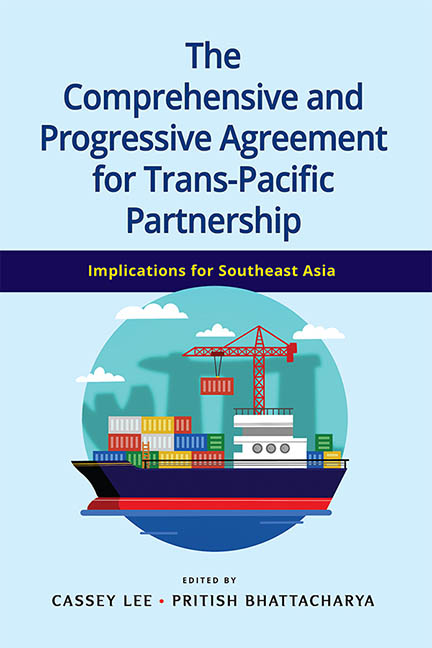Book contents
- Frontmatter
- Contents
- Preface
- Abbreviations
- About the Contributors
- 1 Introduction
- 2 The Economics of the CPTPP and RCEP: Asia Pacific Trade Agreements without the United States
- 3 The TPP and CPTPP: Truths about Power Politics
- 4 The Investment Chapter and ISDS in the CPTPP: Lessons from and for Southeast Asia
- 5 Intellectual Property in the CTPP and Access to Medicines A Thai Perspective
- 6 New Rules for State-Owned Enterprises in the CPTPP
- 7 Impact of the CPTPP on Japanese Manufacturing Affiliates in ASEAN
- 8 Reassessing Malaysia’s Export Opportunities in the TPP and CPTPP
- 9 Impact of the CPTPP on Vietnam
- 10 Should Thailand Join the CPTPP?
- 11 Indonesia, the TPP and CPTPP: Hold Your Breath
- Index
5 - Intellectual Property in the CTPP and Access to Medicines A Thai Perspective
Published online by Cambridge University Press: 08 October 2021
- Frontmatter
- Contents
- Preface
- Abbreviations
- About the Contributors
- 1 Introduction
- 2 The Economics of the CPTPP and RCEP: Asia Pacific Trade Agreements without the United States
- 3 The TPP and CPTPP: Truths about Power Politics
- 4 The Investment Chapter and ISDS in the CPTPP: Lessons from and for Southeast Asia
- 5 Intellectual Property in the CTPP and Access to Medicines A Thai Perspective
- 6 New Rules for State-Owned Enterprises in the CPTPP
- 7 Impact of the CPTPP on Japanese Manufacturing Affiliates in ASEAN
- 8 Reassessing Malaysia’s Export Opportunities in the TPP and CPTPP
- 9 Impact of the CPTPP on Vietnam
- 10 Should Thailand Join the CPTPP?
- 11 Indonesia, the TPP and CPTPP: Hold Your Breath
- Index
Summary
Introduction
The intellectual property (IP) chapter in the Comprehensive and Progressive Agreement for Trans-Pacific Partnership (CPTPP) covers almost all categories of IP rights. It introduces even higher standards of IP protection than those in the World Trade Organization (WTO) Trade-Related Aspects of Intellectual Property Rights (TRIPS) Agreement (the so-called TRIPS-Plus provisions). The CPTPP binds the participating countries and obliges them to provide more extensive IP protection. The IP chapter under the CPTPP, however, will undermine countries’ substantive ability to deal with public health problems. First, the proposed rules will have negative implications on access to medicines by limiting flexibilities that the countries currently have under the WTO TRIPS Agreement; for example, by restricting the right of governments to allow the production, marketing and import of generic medicines. The treaty has also introduced a language that will undermine the ability of the participating countries to make use of compulsory licensing as a means to obtain differentially priced generic products and restrict the measures that can be taken to pursue the option of affordable drugs. This chapter aims to examine the CPTPP IP provisions related to pharmaceuticals and assess their possible impact on public health. In order to do so, Thailand's experience with the TRIPS-Plus IP rules, together with the implications on access to medicines, is presented as a case study.
General Background of the CPTPP
In the late 1980s, a number of countries, including Taiwan, South Korea, India, Thailand and Indonesia, were placed under tremendous pressure by developed countries to improve their laws for IP protection. In particular, the United States, the world's largest trading nation, exerted significant bilateral pressure, by withdrawing or threatening to withdraw trade privileges they offered to developing countries under the Generalized System of Preferences (GSP). The developed nations also threatened to impose trade sanctions on the countries that failed to provide adequate and effective IP protection. As a result, the developing countries decided to revise their IP laws to increase the protection level even before the adoption of the WTO TRIPS Agreement in 1994. In addition to the aggressive unilateralism and bilateralism, the industrialized countries’ IP norm-setting activities also took place on a plurilateral level.
- Type
- Chapter
- Information
- Publisher: ISEAS–Yusof Ishak InstitutePrint publication year: 2021



